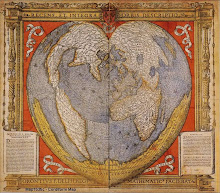Tuesday, August 19, 2008
Milton's motives and authority
One of the things that intrigues me about Paradise Lost is Milton himself, and his reasons for writing it. We have learned a lot this semester that helps to put this poem in context, much about the period's history and the mindset of the people. But, at the heart of Paradise Lost is John Milton. Why did he choose to take Genesis, a story that has already been told in the Bible, and essentially rewrite it? And given that so many people at this time believed in the Bible and the story of Genesis, based their entire lives on it, in fact, what gives Milton the authority to rewrite it? Why should people read this poem and think critically about it? It seems to me that Milton may have been taking a big risk at the time by choosing this subject matter and doing what he does with it. In book 5, Raphael explains to Adam that there are problems with relating a story of a religious nature with all its mysteries, in a way that can be understood and beleived. I think one of the ways in which Milton reconciles these problems of authority is through the use of his muse. Several times in Paradise Lost, Milton invokes a muse to tell his story. While the poem is partially based on Genesis, it is also largely a product of Milton's imagination. By invoking the muses, Milton manages to make the poem a divinely inspired peice and it is perhaps this that gives him the authority. To what extent did Milton beleive in this divine inspiration? How much of it was just an oppertunity for social and religious commentary? I'm not sure, but it seems likely that it was a combination of the two. Regardless of his motives, Milton does seem to be successful in acheiving a great authority over such a controversial topic.
Subscribe to:
Post Comments (Atom)

No comments:
Post a Comment